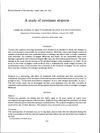 147 citations
,
April 1994 in “Drug Safety”
147 citations
,
April 1994 in “Drug Safety” Some drugs can cause hair loss or increase hair growth, but these effects are usually reversible when the drug is stopped.
 1 citations
,
February 1994 in “Drug Investigation”
1 citations
,
February 1994 in “Drug Investigation” Sulfasalazine might cause hair loss, especially in women, and stopping it can reverse the hair loss.
 15 citations
,
September 1992 in “The Lancet”
15 citations
,
September 1992 in “The Lancet” Stopping minoxidil caused significant hair loss, but regrowth occurred after resuming use.
 45 citations
,
January 1992 in “Dermatology”
45 citations
,
January 1992 in “Dermatology” Half of the patients treated with a specific drug for skin cancer experienced hair loss not related to the drug's dosage.
 8 citations
,
November 1990 in “International Journal of Dermatology”
8 citations
,
November 1990 in “International Journal of Dermatology” Albendazole may cause hair loss.
 20 citations
,
July 1990 in “Journal of the American Academy of Dermatology”
20 citations
,
July 1990 in “Journal of the American Academy of Dermatology” Captopril may cause hair loss, as shown by a woman's hair regrowing after stopping the medication.
 34 citations
,
June 1990 in “British Journal of Dermatology”
34 citations
,
June 1990 in “British Journal of Dermatology” Etretinate treatment changed hair growth patterns in many patients.
 20 citations
,
March 1990 in “JAMA”
20 citations
,
March 1990 in “JAMA” Topical eye β-blockers may cause hair loss.
 4 citations
,
March 1989 in “The BMJ”
4 citations
,
March 1989 in “The BMJ” Naproxen is not the cause of hair loss in a child; it's due to a toxic event with expected hair regrowth.
 7 citations
,
April 1987 in “International Journal of Dermatology”
7 citations
,
April 1987 in “International Journal of Dermatology” Stopping imipramine reduced the woman's hair loss.
 19 citations
,
March 1987 in “International Journal of Dermatology”
19 citations
,
March 1987 in “International Journal of Dermatology” A drug called cimetidine can help treat hair loss in women by blocking androgen receptors. However, it's not the first choice and needs more research.
28 citations
,
March 1986 in “The American journal of medicine” Too much vitamin A can cause liver damage and skin issues.
 18 citations
,
October 1984 in “International Journal of Dermatology”
18 citations
,
October 1984 in “International Journal of Dermatology” Lithium therapy may cause temporary hair loss, with possible regrowth if treatment is stopped or continued.
13 citations
,
March 1983 in “International Journal of Dermatology” Minoxidil caused red hair to grow on a man's temples.
17 citations
,
November 1982 in “Annals of Internal Medicine” 5-aminosalicylic acid enemas may cause hair loss.
24 citations
,
November 1978 in “JAMA” Valproic acid is effective for various seizures, but may cause temporary side effects like drowsiness and stomach issues.
 7 citations
,
May 1978 in “International Journal of Dermatology”
7 citations
,
May 1978 in “International Journal of Dermatology” Recent hair loss research shows some progress, especially in understanding male pattern baldness, but effective treatments for many types of hair loss are still lacking.
59 citations
,
October 1976 in “Acta Neurologica Scandinavica” Sodium valproate reduced seizures in many patients with resistant epilepsy.
170 citations
,
June 1974 in “BMJ” Sodium valproate effectively reduces seizures in epilepsy, especially in absences and myoclonic types, with minimal side effects.
 33 citations
,
August 1973 in “American Heart Journal”
33 citations
,
August 1973 in “American Heart Journal” Propranolol can cause reversible hair loss.
4 citations
,
March 1968 in “The Lancet” Avoiding aspirin may prevent hair loss.


















